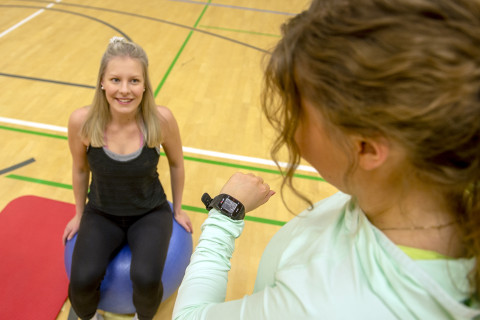Are you one those people who check their sleep score first thing in the morning? Do you keep track of your heart rate variability and recovery times? The number of self-trackers keeps on growing. A psychologist, however, warns against reducing health to mere numbers.
Self-tracking of health is very trendy at the moment, and new devices are introduced to the market on a regular basis. Technological development and medical advances are likely the most important underlying factors – in other words, we are interested in the quantified self simply because we can. However, there are other factors at play, too.
“An individualistic conception of the self is becoming more and more popular in the west. The responsibility of an individual is also emphasised in the idea that health and well-being are merely the result of an individual's choices and lifestyles,” University Lecturer of Health Psychology Sanna Sinikallio explains.
Sinikallio’s research focuses on the psychology of health in particular, and she also works as an occupational psychologist. According to her, there are both pros and cons in self-tracking.
“After looking into this in more detail, however, I was surprised by how critical my own attitude towards self-tracking is – that is, when we are talking about people whose health really doesn’t require constant monitoring.”
An individualistic conception of the self is emphasised in the idea that health and well-being are merely the result of an individual's choices and lifestyles.
In the western culture, the finger is always pointed at the individual, for better or for worse. When we look at someone who is fit and good-looking, we think that they’ve done something right.
“I would advise caution when it comes to these norms that are dictated from the outside. Health and well-being really are a sum of things, phenomena and experiences.”
According to Sinikallio, the problem with self-tracking is that it focuses on one thing only without seeing the big picture.
“Self-tracking is only a small part of health promotion, and there isn’t much research on the topic yet. Devices work well in boosting motivation and giving feedback, bur otherwise I’d be wary of them.”
People need to feel like they are in control of their life. As our world is becoming more and more scattered, self-tracking makes us feel like we’re on top of at least something and, according to Sinikallio, this creates an illusion of having control over our life.
“Yet, we are driven by our instincts and urges, and our actions are guided by socio-economic and cultural factors, among other things. The behaviour we are conscious of is just the tip of an iceberg, and many of our day-to-day choices are made on other grounds than those related to health.”
Self-tracking is only a small part of health promotion, and there isn’t much research on the topic yet.
Sanna Sinikallio, University Lecturer of Health Promotion

Self-tracking provides insight into vital functions that we wouldn’t otherwise pay attention to.
“In my opinion, self-tracking becomes problematic when people trust the data too much. For example, the data current devices can provide on sleep is nothing but a very rough estimate. Today’s self-tracking devices simply aren’t sophisticated enough to measure what really goes on in the brain and the body during sleep.”
The data can, of course, give some idea and perhaps even alert the tracker to think about whether he or she gets enough sleep.
“But do we really want to reduce our experience of well-being to what self-tracking devices can tell us? It is an important skill to be aware of what goes on in one’s mind and body without having to keep a separate track.”
And what is more real: how one feels or what a self-tracking device tells us? Is it OK to feel good even if the data suggests otherwise?
Service providers now have access to a vast amount of data on what self-trackers do.
Sanna Sinikallio, University Lecturer of Health Promotion
Heart rate monitors, smart watches and wellness rings are usually worn by people who, from the looks of it, already have their life under control.
“It is true that people from disadvantaged socio-economic backgrounds don’t usually walk around wearing a smart ring.“
Self-tracking devices seem to have something in common with functional foods: they are consumed by people who don’t need them.
Sinikallio also draws attention to health literacy. How aware are we, as citizens, of what happens to our data?
“Service providers now have access to a vast amount of data on what self-trackers do. Do we want that data to be available to others – considering that no one seems to know what happens to the data and what is being done with it?”
While biohackers swear by self-tracking, saying it boosts their performance or makes them the best version of themselves, the markets are also witnessing development in the other direction.
“I just purchased a felted ‘passivity bracelet’. It doesn’t give me any data; its warmth against my wrist just reminds me of the importance of rest and relaxation.”



